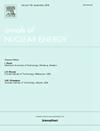Main results of an in-vessel corium thermochemistry benchmark based on MASCA and CORDEB2 experimental data
IF 1.9
3区 工程技术
Q1 NUCLEAR SCIENCE & TECHNOLOGY
引用次数: 0
Abstract
This paper is dedicated to an international benchmark on in-vessel corium thermochemistry. Composed of three different steps, it was constructed in the frame of the IAEA Coordinated Research Project on In-Vessel Melt Retention and focuses on the stratification of corium in the lower plenum of a reactor vessel during a severe accident. The experimental data obtained from the MASCA and CORDEB2 programs is utilized to validate and calibrate the models of the various codes employed by the participants. The paper gives an overview of the different models, including their underlying assumptions. The results show that the models are generally in good agreement with the experimental data, but further experimental data is needed for model validation. Besides the need for further work, this paper highlights the fact that integral models (published in the open literature for most of them) are available to account for the first-order phenomena associated with in-vessel corium. Accordingly, this paper may be useful for code developers that would like to upgrade their models in order to take into account transient stratification kinetics, a prerequisite for a state-of-the-art analysis of in-vessel melt retention.
基于MASCA和CORDEB2实验数据的容器内堆芯热化学基准的主要结果
本文致力于建立一个容器内堆芯热化学的国际基准。它由三个不同的步骤组成,是在原子能机构容器内熔体滞留协调研究项目的框架内建造的,重点是在严重事故期间反应堆容器下部静压室的堆芯分层。利用从MASCA和CORDEB2程序获得的实验数据,对参与者使用的各种代码模型进行了验证和校准。本文概述了不同的模型,包括它们的基本假设。结果表明,模型与实验数据基本吻合,但还需要进一步的实验数据进行验证。除了需要进一步的工作外,本文还强调了这样一个事实,即积分模型(大多数已发表在公开文献中)可用于解释与容器内堆芯有关的一阶现象。因此,本文可能对代码开发人员有用,他们希望升级他们的模型,以便考虑瞬态分层动力学,这是最先进的容器内熔体保留分析的先决条件。
本文章由计算机程序翻译,如有差异,请以英文原文为准。
求助全文
约1分钟内获得全文
求助全文
来源期刊

Annals of Nuclear Energy
工程技术-核科学技术
CiteScore
4.30
自引率
21.10%
发文量
632
审稿时长
7.3 months
期刊介绍:
Annals of Nuclear Energy provides an international medium for the communication of original research, ideas and developments in all areas of the field of nuclear energy science and technology. Its scope embraces nuclear fuel reserves, fuel cycles and cost, materials, processing, system and component technology (fission only), design and optimization, direct conversion of nuclear energy sources, environmental control, reactor physics, heat transfer and fluid dynamics, structural analysis, fuel management, future developments, nuclear fuel and safety, nuclear aerosol, neutron physics, computer technology (both software and hardware), risk assessment, radioactive waste disposal and reactor thermal hydraulics. Papers submitted to Annals need to demonstrate a clear link to nuclear power generation/nuclear engineering. Papers which deal with pure nuclear physics, pure health physics, imaging, or attenuation and shielding properties of concretes and various geological materials are not within the scope of the journal. Also, papers that deal with policy or economics are not within the scope of the journal.
 求助内容:
求助内容: 应助结果提醒方式:
应助结果提醒方式:


